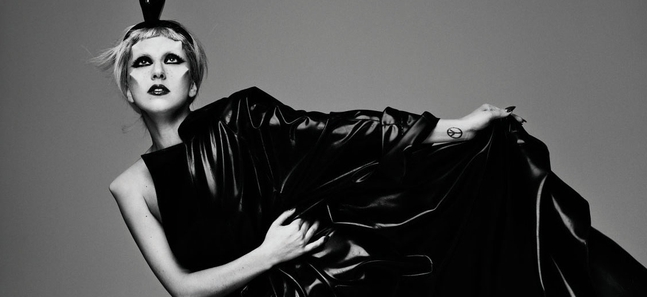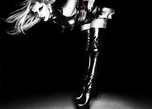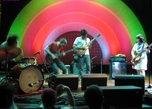Lady Gaga: the interview
'No matter how many Number Ones you have, you can still wake up and feel like a loser'

Photo by Mariano Vivanco
Posted: Wed May 25 2011
Part 1 | Part 2
'I'm not interested in people positioning me next to other artists,' announces the singer sitting in a recording studio with Time Out. 'I just want to make my music.' A bold claim from someone who has appeared in public dressed in numerous decapitated Kermits, a gas mask, a gyroscope, a large lampshade, a massive egg and a dress made entirely of meat. And these looks have been hard to miss, because for the last three years Lady Gaga has dominated pop's field of vision in a way other artists with comparable sales have not.
She is the internet age’s first true pop phenomenon, but mo’ Twitter followers (she hit ten million last week), mo’ problems. While no megastar in history has been able to connect with their audience so easily, nor has any been quite this easy to heckle. In February her much-trumpeted big comeback single, 'Born This Way', was loudly criticised for sounding too much like Madonna; its successor, 'Judas', was rounded upon for being too much like, er, Lady Gaga.
'It's part of the whole internet culture,' she declares. 'People want you to fail. People want to tear me down, they were going to knife me anyway. The good news it that when they look back they'll all remember how brave I was: "She put out a record about being yourself, and we crucified her for it, but she soared on and sat at Number One for six weeks and told everyone to FUCK OFF!" '
It wasn't 'Born This Way' that told everyone to fuck off. Earlier this month, with an album release looming, 'Judas' tumbling down the charts and the album's artwork being widely derided, a miniature backlash seemed to be gathering pace. Then with little fanfare and no overhyped video, a song called 'The Edge of Glory' appeared on iTunes. It was supposed to be an album teaser, and Gaga's label didn’t even take it to radio.
It hit Number One on iTunes around the world. It was a reminder that all those outfits would have counted for nothing if her first single, 'Just Dance', hadn’t been a little bit special, or if subsequent releases such as 'Bad Romance' hadn’t been pretty listenable to boot. Perhaps this is why Gaga, as she sits in front of me now,
flicking through her iPod and blasting out tunes from her album, is so excited. She is certain she has made a brilliant album. 'Maybe I'm out of my mind, but I believe
the number of albums we're going to sell is ridiculous,' she says. She plays us a
big-chorused but dark-as-you-like techno song called 'Government Hooker', which is about voters and plastic pop stars who are happy to carry on doing what they do 'as long as they continue to get fucked'. Then she plays 'Hair', which sounds like Bruce Springsteen at Eurovision, and explains that she wants the video to feature every wig she's ever worn flying across the screen. 'I’m not a sandwich store that only sells turkey sandwiches,' she says. 'I sell a lot of different things.'
What did you find out about yourself in writing these songs?
That being bullied stays with you your whole life, and no matter how many people are screaming your name or how many Number One hits you have, you can still wake up and feel like a loser.
Don’t you consider your success a massive 'piss off!' to the bullies?
Well, in order for me to be successful... In order to be a great artist – musician, actor, painter, whatever – you must be able to be private in public at all times. That is what we do.
Okay…
I mean, I could elaborate... [Miniature pause while she pretends she might not elaborate...] Unless I am both capable of and willing to reopen the wound every time I write a song, if I choose to not look inside myself to write music, I'm really not worth being called an artist at all.
Who was your worst bully at school?
[Looks a bit wobbly] I... see... her... in my head. [Stops looking wobbly] There were a lot of bullies. You have to open the wound and pour salt and arsenic and poison in that wound and you must get out a needle and poke and prod then sew it back up again. And when I'm handed a beat that sounds amazing, that beat is the scissors, and then I cut the wound I've just sewn up, and I go back in. I go back in and I ask myself the same questions again and again and again: why am I here?
And the answer is…
Because I MUST be here. Because I know it is my purpose to be an artist, but I have to go back over and over that wound, being bullied, feeling insecure, all things that recurred in my childhood and continue to recur through my career. You can’t look me in the eye and tell me I'm one of them: I know I'm not. And I never will be.
One of 'them'? Who are 'they'?
The in-crowd. Right? I don’t really want to be one of them, yet it [the bullying] affected me so deeply that I have to go in over and over and over again to write music.
Your touring entourage seems pretty close-knit. How do you make sure you haven't created your own in-crowd?
If you were not bullied in high school I can imagine that it might be a bit difficult to be around us, because we kind of flock together. But there's no discrimination. I mean if you were a cool kid at school, that doesn't mean you're not welcome. I'm not trying to further divisiveness. Those people who feel bullied or like nerds, I'm trying to make them feel like winners, but I'm not trying to make them hate all of the cool kids more. It's all about closing the gap and bringing people closer together. And that's what the pop end of my music is all about. Interview continues here...
Tweets
- About Us |
- Work for Time Out |
- Send us info |
- Advertising |
- Mobile edition |
- Terms & Conditions |
- Privacy policy |
- Contact Us
Copyright © 2014 Time Out Tokyo














Add your comment